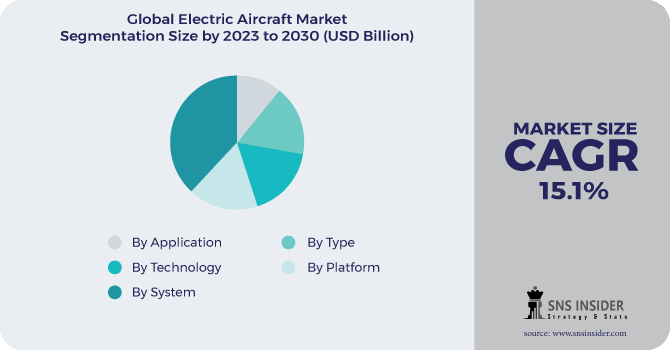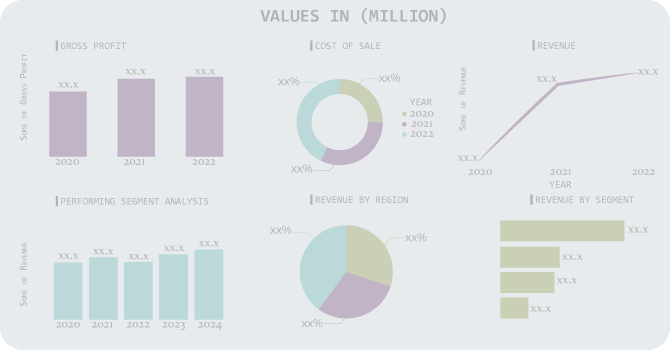Electric Aircraft Market Report Scope & Overview:
The Electric Aircraft Market Size was valued at USD 9.44 billion in 2022 and is expected to reach USD 29.10 billion by 2030 and grow at a CAGR of 15.1% over the forecast period 2023-2030.
The market for electric aircraft is expanding, as OEM airlines understand the potential benefits of design, such as increased environmental efficiency, reduced support costs, and improved reliability through the use of modern power electronics and slow-moving air components in engine installation. Additional short-range electric aircraft are expected to operate in local transportation in the coming years. More electric aircraft can prove military demand in the coming years, thanks to the ability to maintain these aircraft given self-control in their quiet operation. The same applies to military UAVs, which are acquired through ISR operations.
.png)
To get more information on Electric Aircraft Market - Request Free Sample Report
MARKET DYNAMICS
KEY DRIVERS
-
Environment Pollution Control
-
Carbon-dioxide emissions
-
electric aircraft
RESTRAINTS
-
Low energy density of batteries.
-
Time Consuming
-
Lack of skills
OPPORTUNITIES
-
zero-emission aircraft's
-
Electric aircraft
-
Heavy logistics
CHALLENGES
-
High cost
-
Labour
-
Hardware
-
Technology
THE IMPACT OF COVID-19
The COVID-19 pandemic has mostly impacted the electric aircraft industry. Many more electric aircraft market businesses were forced to halt production due to international border closures and air travel restrictions. This pause in commercial activity has a direct impact on the earnings of the increasingly electric aircraft industry. Despite the fact that some enterprises continued to operate, delays in raw material deliveries and a limited stock of manufactured items covered the creation and reduced capacity utilization rates.
The aviation industry's short-term outlook will ultimately be determined by how quickly governments quell the flare-up and how beneficial their efforts are. Postponements in aircraft conveyances and cancellations of current requests have had a significant impact on aircraft manufacturers worldwide.
KEY MARKET SEGMENTATION
By System
-
Batteries
-
Electric Motors
-
Aerostructures
-
Avionics
-
Software
-
Others
By Platform
-
Regional Transport Aircraft
-
Light & Ultralight Aircraft
By Application
-
Civil
-
Military
By Technology
-
CTOL
-
STOL
-
VTOL
By Type
-
Fixed Wing
-
Rotary Wing
-
Hybrid Wing

Need any customization research on Electric Aircraft Market - Enquiry Now
REGIONAL ANALYSIS
the European airline holds the largest share of revenue by 2021. The region quickly adopted advanced materials, such as gamma-titanium aluminide. This value enhances mechanical transformation features and reduces fuel consumption, carbon emissions, and noise levels. The presence of a number of key market players, as well as their increasing investment in research and development activities, is driving the growth of the commercial aviation market in various regions. Regulatory bodies, such as the European Union Aviation Safety Agency, have focused on reducing air pollution levels, and this has encouraged market growth in the European region. The economic conditions of the people in this region are better compared to other regions, therefore, they can afford short-distance electric aircraft. The market in North America is expected to grow at a significant rate during the forecast period. In the North American region, electric aircraft are increasingly being distributed by urban airflow, and this feature is expected to further market growth in the region. Many environmentalists travel short distances by electric aircraft and this furthers the demand for the product. The presence of a few key market players and their growing investment in research and development activities are factors that drive the growth of the aviation market in the Asia Pacific region. The growing growth in the aviation industry is encouraging the demand for electric aircraft in countries such as India. In addition, China and Japan are expected to play a significant role in revenue growth in the Asia Pacific region.
REGIONAL COVERAGE:
North America
-
USA
-
Canada
-
Mexico
Europe
-
Germany
-
UK
-
France
-
Italy
-
Spain
-
The Netherlands
-
Rest of Europe
Asia-Pacific
-
Japan
-
South Korea
-
China
-
India
-
Australia
-
Rest of Asia-Pacific
The Middle East & Africa
-
Israel
-
UAE
-
South Africa
-
Rest of Middle East & Africa
Latin America
-
Brazil
-
Argentina
-
Rest of Latin America
KEY PLAYERS
The Major Players are Airbus, Yuneec Holding Limited, Pipistrel Group, Bye Aerospace, Digisky S.R.L, Leonardo S.p.A., Groupe Gorgé, EHang Holdings Limited, Faradair Aerospace Limited, and Boeing are among the market's major players.
Pipistrel Group-Company Financial Analysis

| Report Attributes | Details |
|---|---|
| Market Size in 2022 | US$ 9.44 Billion |
| Market Size by 2030 | US$ 29.10 Billion |
| CAGR | CAGR of 15.1% From 2023 to 2030 |
| Base Year | 2022 |
| Forecast Period | 2023-2030 |
| Historical Data | 2020-2021 |
| Report Scope & Coverage | Market Size, Segments Analysis, Competitive Landscape, Regional Analysis, DROC & SWOT Analysis, Forecast Outlook |
| Key Segments | • By System (Batteries, Electric Motors, Aerostructures, Avionics, Software, Others) • By Platform (Regional Transport Aircraft, Business Jets, Light & Ultralight Aircraft) • By Application (Civil, Military) • By Technology (CTOL, STOL, VTOL) • By Type (Fixed Wing, Rotary Wing, Hybrid Wing) |
| Regional Analysis/Coverage | North America (USA, Canada, Mexico), Europe (Germany, UK, France, Italy, Spain, Netherlands, Rest of Europe), Asia-Pacific (Japan, South Korea, China, India, Australia, Rest of Asia-Pacific), The Middle East & Africa (Israel, UAE, South Africa, Rest of Middle East & Africa), Latin America (Brazil, Argentina, Rest of Latin America) |
| Company Profiles | Airbus, Yuneec Holding Limited, Pipistrel Group, Bye Aerospace, Digisky S.R.L, Leonardo S.p.A., Groupe Gorgé, EHang Holdings Limited, Faradair Aerospace Limited, and Boeing are among the market's major players. |
| Key Drivers | • Environment pollution control. • Carbon-dioxide emissions. |
| RESTRAINTS | • zero-emission aircraft's • Electric aircraft |

